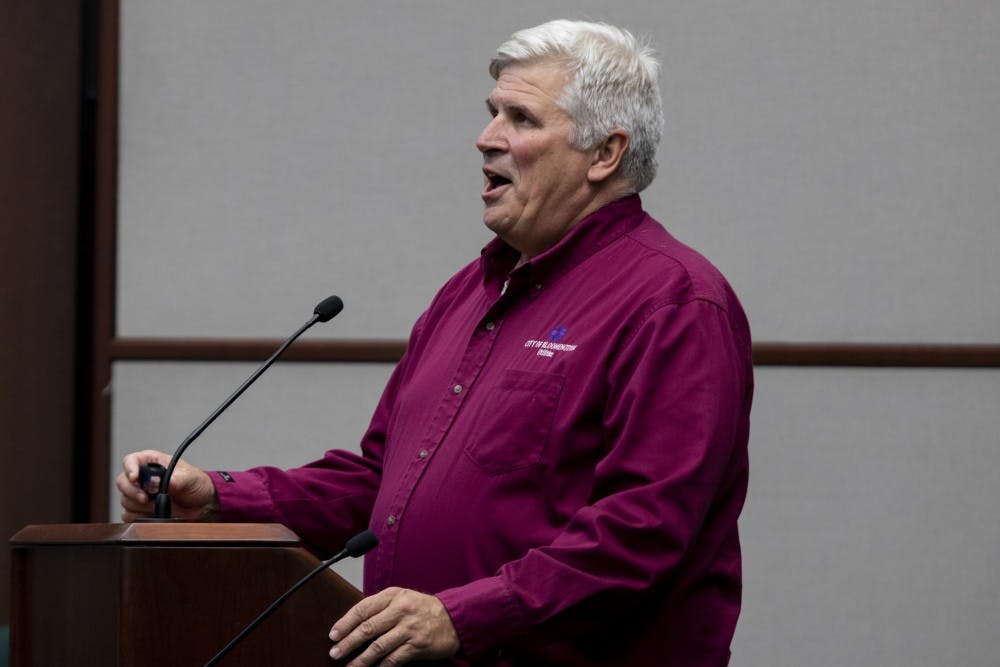The Bloomington City Council voted Wednesday night on multiple changes regarding the sewer system.
The council discussed the issuance of bonds for the Monroe County Redevelopment Commission, refunding bonds for the sewage works, a rate increase for sewer utilities and waiving connection fees in certain contexts.
Jeff Cockerill, a Monroe County attorney representing the county’s Redevelopment Commission, spoke on an ordinance to authorize insurance bonds for the commission to extend streets around Profile Parkway to increase interconnectivity in the area.
Both council members Steve Volan and Isabel Piedmont-Smith asked about pedestrian infrastructure. Although Cockerill assured them pedestrian infrastructure was being developed along the new street, public commenter Greg Alexander thought otherwise.
“We don’t have a sidewalk network,” Alexander said. “You guys haven’t put the money toward it.”
The council voted unanimously to approve the ordinance.
City of Bloomington Utilities director Vic Kelson presented the 2019 sewer rate review, a formal report on the state of the city’s sewers. In 2016, the review led to a 22% increase in charges for the sewer works. Kelson said it covered inflation, plant modernization and capacity improvement.
He says the modernization projects will help significant improvements in efficiency and reduce the department’s carbon footprint.
Jennifer Wilson, a representative from the Indianapolis-based accounting firm Crowe LLP, gave a report on how CBU is planning on funding the city’s $75 million capital improvement plan over the next few years, including bonds, the cash balance they have built up over the past few years and the rate increases for using the sewer system both inside and outside the city limits.
The CBU proposed a 15% rate increase for customers living outside the city limits and a 3% increase for customers in the city limits.
“The charges reflect the differences in providing the service to two different classes of customers,” Kelson said.
For costs outside the city, the difference between the old and new rates with a surcharge is less than $10.
“You’re taking pipes outside of the city that CBU is responsible for, and we’re going outside the city limits,” council member Dorothy Granger said. “The surcharge is the cost for those services.”
Most council members agreed with the proposal.
“When we vote for these increases, I pay these increases, too,” council member Jim Sims said. “Water source infrastructure just has to be done, so I will be supporting this.”
Citizens speaking during public comment did not support the proposal.
“It’s a thing a law allows you to do, but there are a lot of bad laws in the state, and this may be one of them,” county resident Gary Arbeiter said.
The council voted 7 in favor. Council member Chris Sturbaum passed his vote.
The next ordinance covered cutting fees related to the sewer system rather than raising them.
Assistant city attorney Christopher Wheeler spoke on an ordinance proposing waiving the connection fee when beginning to use the city’s sewer system.
“I think this is a fantastic idea,” council member Dave Rollo said. “For low income residents, it’s very important.”
One group that would be allowed to use the waivers is property owners within the city limits who want to abandon septic systems to connect to the sewer system.
“We believe that with a properly functioning septic system, you have to rely upon each individual property owner to maintain it and let them determine when to abandon it,” Wheeler said. “We want to provide incentive to connect to the sewer system by waiving the connection fee.”
People living in affordable housing for single families, for whom the connection fee can be almost $3,000, would also qualify. Lindsay Brown, a resident in the BroadView neighborhood, described the hardships the fee put her through.
“Myself and other people in the neighborhood can not afford this fee of $2,800,” Brown said. “It would be very helpful to have this waiver in place.”
The ordinance was passed unanimously.




